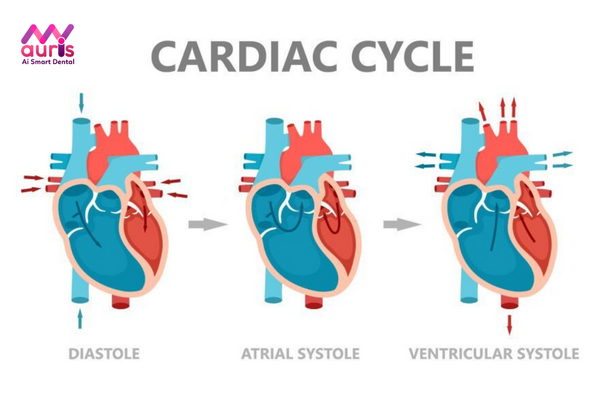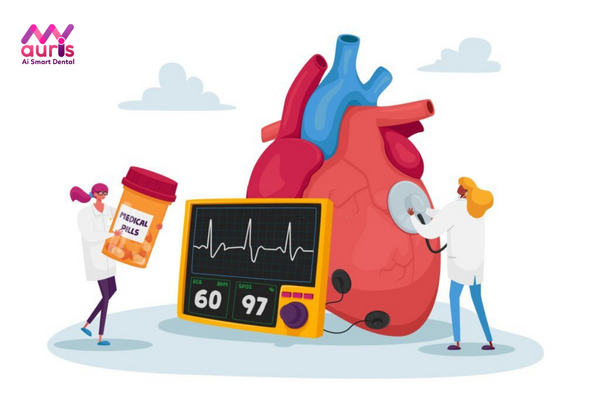The heart is an important part of the human body, the activity of the heart helps you maintain life for the whole body. According to doctors, heart rate is an important indicator that reflects a person’s health status. So the question is what is a normal heart rate? What pulse rate is safe? The following article My Auris will provide you with the necessary information, answer issues related to heart rate and the most appropriate cardiovascular health care regimen.
Learn information about heart rate and heart cycle
Information about what a normal heart rate is will be explained to you after providing basic information about heart rate. Through that, it helps you have a comprehensive view and a better way to take care of your health.
What is heart rate?

Heart rate is one of the important signs of human health, they are measured by the number of heartbeats. beat for one minute. The heart rate of a normal person will change depending on the state of your body being active or resting, the stress level of the nervous system and changes in health, age is also a factor that causes your heart rate to fluctuate.
Therefore, the question of what is a normal heart rate is always a question many people need an answer to. answer.
What is the cardiac cycle?
Normal human heart rate is always calculated periodically and regularly in a person’s life the heart will beat about 3000 million times. Each independent, individual cardiac cycle will be calculated by the time interval from the beginning of one heart sound to the beginning of the next heart sound. The time it takes to keep the first heartbeat until the second is called a heartbeat.

Normally, a cardiac cycle is divided into 3 phases: ventricular filling phase, contraction phase (systole), dilated (diastolic). When the heart rate changes, the time between systole and systole changessame change. The phenomenon of fast heart rate, diastolic will be much shorter than systolic and vice versa.
Answer What is a normal heart rate?
Question What is a normal heart rate is always a common question of many people and needs answers from experts. Some of the following information will be your answer.
According to experts, there is no fixed normal heart rate index for each person. At different ages, health conditions and states, each person’s normal heart rate will be different. In addition, mood, actions and temperature in the environment also directly affect your heart rate.
What is your normal heart rate when you rest? rest
With the question of what is the normal heart rate when in a state of rest and exercise, researchers point out that there will be differences. If you are in a resting state, the heart rate of adults 10 years and older will fluctuate between 60 and 100 beats/minute.
In the case of people who regularly exercise and exercise, the question of what is a normal heart rate will have a lower answer. They will often fluctuate as low as 60 beats/minute, even as low as 40 beats/minute.

The normal heart rate of each person when in a resting state will be summarized through the table after:
| Age |
Heart rate index (beats/minute) |
| Children under 1 month age | 70 – 190 |
| Children from 1 to 11 months old | 80 – 160 |
| Children from 1 to 2age | 80 – 130 |
| Children from 3 to 4 years old | 80 – 120 |
| Children from 5 to 6 years old | 75 – 115 |
| Children from 7 to 9 years old | 70 – 110 |
| Children 10 years and older | 60 – 100 |
Normal heart rate for each person when playing sports sports
When you exercise, your body will need more energy, causing your heart to work faster and stronger. This happens with the purpose of providing the necessary amount of oxygen as well as energy for the organs to function best. So the question of what is a normal heart rate for someone who exercises will be faster than your resting rate.

In addition, you need to note that if you do too much activity, it can cause heart compression, affecting your health. later. When performing activities, your heart rate can maintain within the following range:
| Age | Heart rate during exercise from 50% to 85%
(beats/minute) |
Heart rate during exercise from 100%
(beats/minute) |
| 20 | 100 – 170 | 200 |
| 30 | 95 -162 | 190 |
| 35 | 93 – 157 | 185 |
| 40 | 90 – 153 > | 180 |
| 45 | 88 – 149 | 175 |
| 50 | 85 – 145 | 170 |
| 55 | 83 – 140 | 165 |
| 60 | 80 – 136 | 160 |
| 65 | 78 – 132 | 155 |
| 70 | 75 – 128 | 150 |
How to take care of your heart health you need to know
After finding out information about what a normal heart rate is, you should also refer to health care methods to best prevent related diseases.
Improving a healthy diet
Daily nutrition is a factor that contributes to improving health, especially for the heart. Specifically:
- Supplement C-rich foodsAnxi, Magnesium, Potassium such as: Green vegetables, cereals, fruits, nuts, etc. Necessary minerals will be provided for all body and cardiovascular activities. A deficiency in these minerals can affect your heart rate.
- Supplement foods rich in Omega-3 such as: Salmon, chia seeds, oysters, mackerel, walnuts, etc. Because according to research, Omega-3 has many effects on cardiovascular health, reducing the risk of arrhythmia and death of patients.

Increase your exercise time
Exercise is always an effective way to help you improve your health. Regular exercise can help keep the body healthy, reducing all pressure on the heart. Helps the heart become stronger and maintain a normal rhythm.
Build a healthy lifestyle
When you build a healthy living habit, it will help your heart function more stably. Because when you are stressed, your heart is also affected. So you can change your habits in the following ways:
- Do not use addictive stimulants such as alcohol, beer, cigarettes,…
- Have yourself a suitable working regime, limit excessive stress.
- Don’t stay up too late and need to sleep on time and get enough sleep.
Hope the above information can help you refer to what a normal heart rate is. Building good habits as well as a good diet and exercise regimen can help you improve your heart health. Limit bad diseases that affect your health in the future.
Yen Nhi





